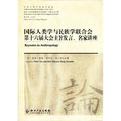国际人类学与民族学联合会第十六届大会主旨发言.名家讲座
2011-11
知识产权出版社
(荷)彼特・纳斯,郝时远,张小敏 主编
183
312000
The International Union of Anthropological and Ethnological
Sciences (IUAES) was established on August 23, 1948, when it
merged, in fact, with the International Congress of Anthropological
and Ethnological Sciences (ICAES), which was founded in 1934. The
latter was the product of various Congresses of Anthropological
Sciences, starting in 1865.
The IUAES is one of the member organizations of the International
Social Science Council (ISSC) and also of the International Council
for Philosophy and Humanistic Studies (ICPHS). The IUAES is also a
member of the International Council of Scientific Unions (ICSU).
Its aim is to enhance exchange and communication among scholars of
all regions of the world, in a collective effort to expand human
knowledge. In this way, it hopes to contribute to a better
understanding of human society, and to a sustainable future based
on harmony between nature and culture. The IUAES once noted a draft
statement on the future of world anthropology in “Current
Anthropology” (1979): “The scope of anthropology in terms of areas
of human interest includes such critical issues of the contemporary
world as problems of environmental management, pressure for the
progressive reduction of disparities and the restructuring of the
world order, the future of the nation-state, ethnic pluralism and
the future of national society, and the harmonization of the roles
and functions of institutions with the basic and derived biological
and psychic drives of man.” The IUAES itself consists of national
and institutional organizations in more than 50 countries in all
parts of the world, and also includes some hundreds of individual
members. The research effort and involvement of the IUAES is
principally arranged by its scientific commissions, of which,
currently, there are twenty-seven, and each of which concentrates
on some areas of anthropological interest. They included ethnic
relations, aging and the aged, women, children, youth, migration,
epidemiology and Aids, tourism, primatology, linguistics, and so
on.
1.Introduction
2.Quo Vadis Homo Sapientissime?Transdisciplinary Perspectives of
Human Ecology
3.Human Evolution in China: Viewed from Multidisciplinary
Records
4.The Origins of the Japanese People
5.Historical Foundation and Current Development of Anthropology and
Ethnology in China
6.Globalization: The Anthropological Perspective
7.Global Economy and Constructed Social Imagination: Intersection
of Aesthetics, Race, Gender and Caste in South Asia
8.Remapping Anthropology's Peripheral Zones
9.Symbols in Place: In Search of the Soul of the City
10.The Chinese High-Tech Professionals in Silicon Valley: From
Scholars to Entrepreneurs
11.Citizenship and the Legitimacy of Governance: Why
Anthropology
12.Dispossession and Displacement to Protect Nature: The Mobile
Harasiis Tribe Faces the 21st Century
13.Contributors
Introduction Peter J.M. Nos Professor Emeritus, Leiden University, Leiden, The Netherlands The contributions to this volume are the outcome of the July-2009 World Congress of the International Union of Anthropological and Ethnological Sciences (IUAES) in Kunming. The book contains several of the keynote speeches and distinguished lectures held during the congress and covers both physical and social anthropology. The organizers of the 16th Congress have accomplished a World Congress of high professional and academic standard with about 170 panels and sessions and more than 4 000 scholars and students from about 100 countries and regions. Due to their great effort and dedication in organizing this Congress on “Humanity, development and cultural diversity”, many thanks go to the Organizing Committee, the China Union of Anthropological and Ethnological Sciences (CUAES), as well as the Chinese anthropological and ethnological academic community. Since 1865 anthropologists have organized various congresses on Anthropological Sciences. In 1934 this was institutionalized in the ICAES (International Congress of Ethnological and Anthropological Sciences). The IUAES took over this task in 1948. So, the year 2009 marked an important anniversary in the history of the IUAES. In 2009 the ICAES, as an institution predating IUAES, existed for 75 years, and considering the incorporation of the congress into the IUAES, the focus also lied on July 2008, which marked the Union's 60th years of existence. In Kunming during the grant opening ceremony of the exhibition on the history of the IUAES, this 60th anniversary was celebrated. It presented a clear message on the role of the IUAES as the main fully worldwide international anthropological organization in the world covering four sciences (social/cultural anthropology, physical anthropology, linguistic anthropology and archaeology) and demonstrated the warm bond between the IUAES and the CUAES, the Chinese national anthropological union. The IUAES has organized a world congress every five years and expanded with the introduction of inter-congresses as well as an increasing number of specialized scientific commissions. The themes of the congresses range over five main topics, namely the public and communication, development and anthropological insights, cultural diversity, physical diversity and the environment. Although the IUAES is most renowned for its congresses and most used by its members for networking as well as cooperation for the realization of scientific publications, particularly through the various Scientific Commissions, it is also representative on the global front by the drafting of a number of statements, enacting as an ethical code. These include statements on technology (1980), development and population displacement (1983), environmental issues with particular reference to enforced migration (1988), the biological aspects of race (1995) and a position statement of the IUAES on the ethics of spying (2004) concerning the participation of anthropologist in light of the Iraq war. In Kunming the IUAES adopted a statement on human rights. All these statements ensure a moral basis on which the IUAES can act upon. ……

国际人类学与民族学联合会第十六届大会主旨发言.名家讲座 PDF格式下载
都是大家发言,看后甚为感动和欣喜,可以知晓前沿动态,赞一个。